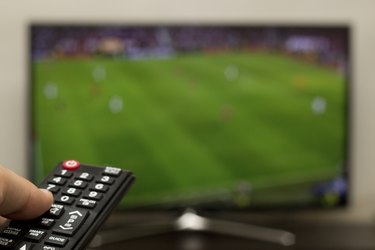
Director Derek Jarman once made a 79-minute movie where the entire video had the screen intentionally filled with blue. Critics and viewers were split about its artistic merits, which is more than can be said for having your entire screen filled with green, no matter what you are trying to watch. Although it involves HDMI cables, it's not the result of a purely physical problem.
Significance of Green Screen
Video of the Day
If your screen is either "snowy" or entirely blank (in other words, black) it is usually a good bet that the problem is a loose, faulty or disconnected cable with no signal getting through. A solid green screen is different, as it shows a signal is getting through, but the intended picture isn't being displayed. The likely cause with an HDMI connection is that the picture is blocked by the "handshake" process.
Video of the Day
HDMI Protection
While HDMI brings simplicity and improved digital signals to consumers, it also allows a feature that's more popular with content producers, namely copy protection. The HDMI protection system involves different devices exchanging authentication keys (secret codes) used to encrypt and decrypt the contents as they travel along the HDMI cable. For example, a Blu-ray player might encrypt the video data and a TV would then decrypt it. Each device that can use an HDMI connection has a special authentication key that determines how it can use a signal.
HDMI Handshake
When you connect two devices with an HDMI cable, the devices exchange authentication keys, a process known as a handshake. Only once both devices have confirmed the keys are genuine and have the relevant license rights can the video transmission begin. For example, a Blu-ray player could handshake with a TV screen and then begin playback. However, if you connected the Blu-ray player to a disc recorder and tried to play back a copy-protected disc, the Blu-ray player might check the disc protection, discover the disc is only licensed to work on playback devices, then discover in the handshake that the disc recorder has the ability to copy disc content. The handshake would then "fail" and the transmission of the video is blocked.
Handshake Problems
The green screen on a playback device connected by HDMI shows a handshake failure. This shouldn't normally happen with devices such as TVs, so it shows something is amiss. One possibility is that the screen is so old that it doesn't support the HDMI copy protection system, known as HDCP. With newer screens, a more likely cause is that there's been a mix-up during the handshake process, a little like having a phone conversation where you start speaking over one another and lose track of who said what.
Handshake Solutions
The solution to a handshake mix-up is that tech classic of switching things off and then on again. You can try unplugging and replugging HDMI cables to see if that sorts the problem out, and even try putting the cable in a different HDMI port if one is available. If that doesn't work, switch both devices off, unplug them from the power outlet, plug them back in, and switch them back on. If this still doesn't solve the problem, you may have to experiment with switching the devices on in a particular order. You may find that you can't rely on the handshake working properly when your TV set automatically switches to an HDMI input, rather than you selecting it manually. If you use an HDMI switcher or splitter box and are getting HDMI handshake failures, try making a direct HDMI cable connection instead. If nothing else works, consult your device user's manuals and investigate whether either or both devices needs a firmware update that may resolve its inability to complete the handshake.